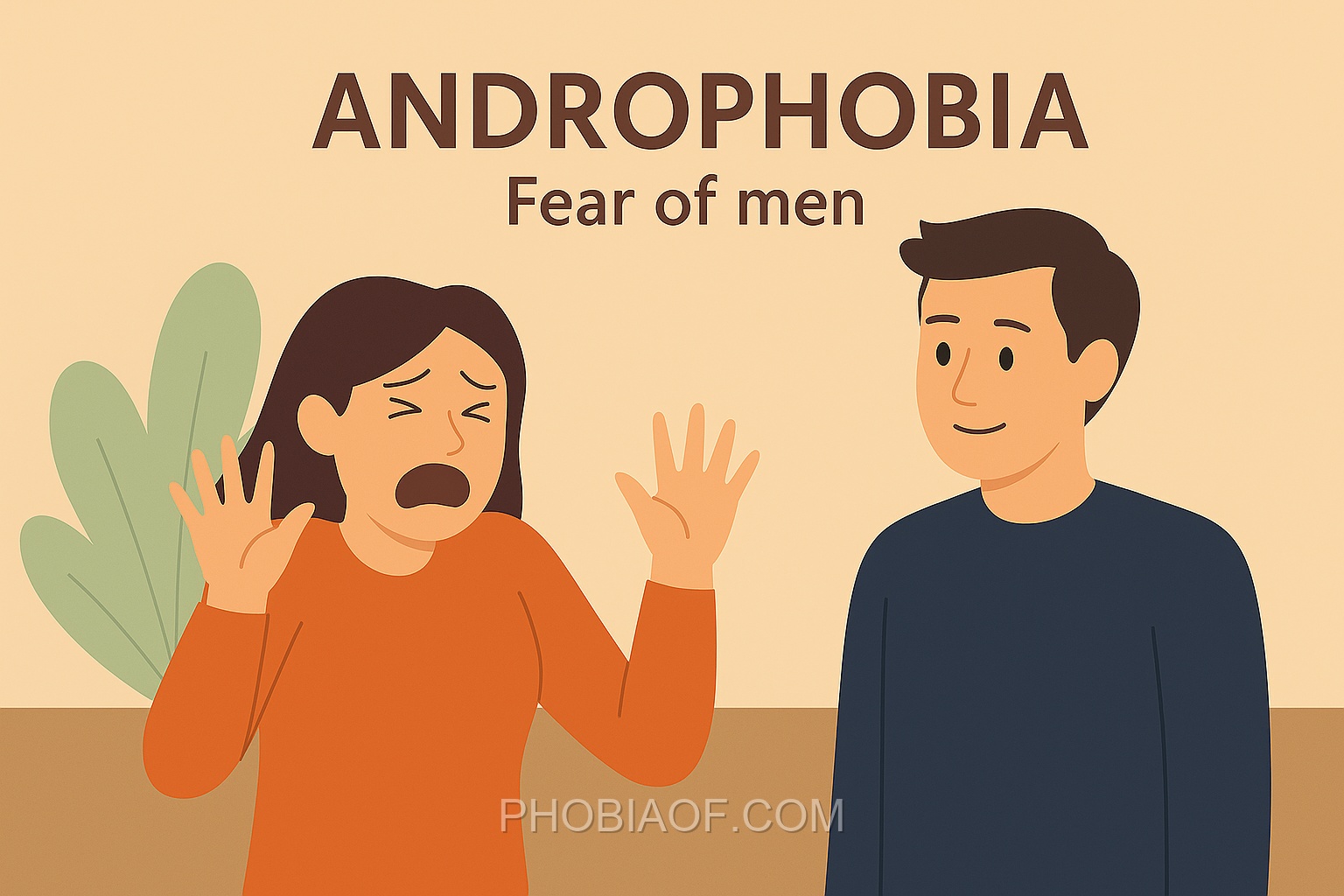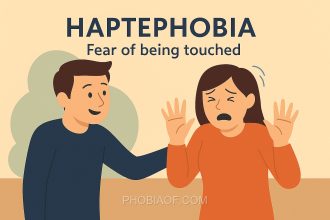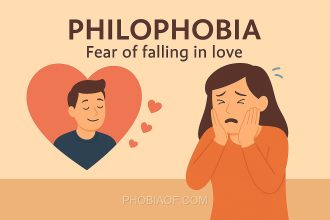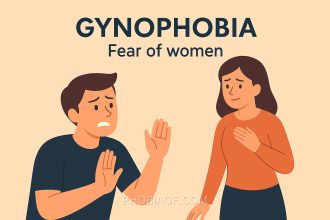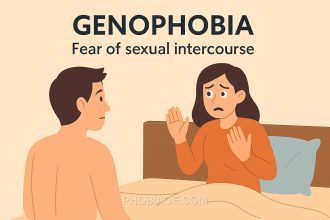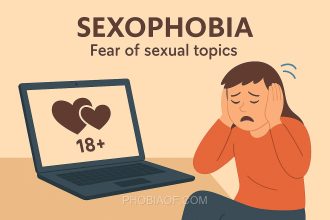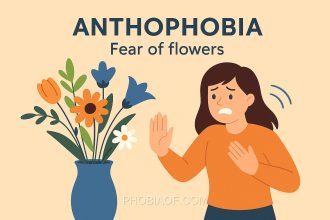Have you ever felt an overwhelming sense of fear or anxiety at the mere presence or thought of men? This is what some people experience when dealing with Androphobia.
Androphobia is a specific phobia characterized by an intense and irrational fear of men. The term originates from the Greek words “andro,” meaning man, and “phobia,” meaning fear. While it’s natural to feel nervous around certain individuals or in unfamiliar situations, people with androphobia experience a persistent and excessive fear that can interfere significantly with their daily lives.
Those affected by androphobia may experience symptoms such as panic attacks, difficulty breathing, rapid heart rate, or a strong desire to avoid places where they might encounter men. This can lead to challenges in social, professional, and personal settings, as the fear might prevent them from engaging fully in activities or relationships that involve men.
Understanding androphobia is the first step toward compassionately supporting those who live with this fear. By acknowledging its impact and origins, we can create a more empathetic environment for everyone.
Causes of Androphobia
Androphobia, the fear of men, can arise from various causes that often intertwine psychological and environmental factors. Understanding these causes can provide insight into why some individuals develop this phobia.
Potential Causes of Androphobia:
- Genetic Predisposition: Some individuals may have a genetic predisposition to anxiety disorders, making them more susceptible to developing specific phobias, including androphobia. This genetic link suggests that a family history of phobias or anxiety might increase the likelihood of developing such fears.
- Traumatic Experiences: Experiencing or witnessing traumatic events involving men can lead to androphobia. Such events might include abuse, assault, or any negative encounters that create lasting fear and anxiety when interacting with men.
- Learned Behavior: Observing others, especially during formative years, can influence one’s fears. If a child grows up in an environment where family members or caregivers exhibit fear or distrust of men, they might learn to adopt similar feelings.
- Psychological Factors: Existing mental health conditions, such as generalized anxiety disorder or post-traumatic stress disorder (PTSD), can contribute to the development of specific phobias. These conditions can heighten an individual’s overall anxiety levels, making them more prone to fears like androphobia.
- Environmental Factors: Cultural or societal influences might play a role in shaping one’s perceptions and fears. Media portrayals, cultural narratives, or societal norms that depict men negatively can impact an individual’s view, potentially leading to phobia development.
Research into the origins of androphobia suggests that it is a complex interplay of these factors rather than a single cause. Each individual’s experience is unique, and the intensity of the phobia can vary widely. Understanding these potential causes can help in addressing and managing the fear effectively.
Symptoms of Androphobia
Androphobia, the fear of men, can be a deeply distressing experience for those who suffer from it. Individuals with this phobia often experience intense fear or anxiety when in the presence of men, or even when thinking about men. This fear can manifest in various ways, impacting both the mind and body. Below are some common symptoms that may occur:
Physical Symptoms:
- Panic attacks, which may include shortness of breath, chest pain, or a choking sensation.
- Excessive sweating, especially in situations where contact with men is anticipated.
- Rapid heartbeat or palpitations when encountering or thinking about men.
- Nausea or gastrointestinal distress in stressful situations involving men.
- Trembling or shaking, indicating heightened anxiety levels.
Emotional/Behavioral Symptoms:
- Avoidance of places or situations where men are likely to be present, such as certain social gatherings or professional settings.
- Overwhelming feelings of dread or terror at the thought of interacting with men.
- Difficulty concentrating or focusing due to pervasive anxiety about men.
- Irritability or mood swings stemming from stress related to the phobia.
- Feelings of powerlessness or helplessness in situations involving men.
When severe, these symptoms can significantly interfere with daily life, affecting personal relationships, career opportunities, and overall well-being.
Treatment for Fear of Men: Overcoming Androphobia
It’s important to know that Androphobia, or the fear of men, can be treated and managed effectively over time. With the right approach and support, you can gradually overcome this fear and lead a fulfilling life. Below, we outline several treatment options and coping strategies that have proven to be successful.
Therapeutic Approaches
Several therapies have been found to be effective in treating Androphobia:
- Exposure Therapy: This involves gradually and systematically facing the fear of men in a controlled and safe environment. By doing so, individuals can slowly desensitize themselves to the fear, reducing anxiety over time.
- Cognitive-Behavioral Therapy (CBT): CBT helps in identifying and changing the fearful thoughts and beliefs associated with men. By restructuring these thought patterns, individuals can reduce the power of their phobia.
- Counseling: Speaking with a trained therapist can provide a supportive space to explore the roots of the fear and develop personalized coping strategies.
Self-Help Coping Techniques
In addition to therapy, there are several self-help techniques that can complement professional treatment:
- Relaxation Exercises: Techniques such as deep breathing, progressive muscle relaxation, and yoga can help reduce anxiety and promote a sense of calm.
- Meditation: Mindfulness meditation can increase awareness and help individuals manage their fear response more effectively.
- Support Groups: Connecting with others who have similar experiences can provide validation, encouragement, and practical advice.
Medication
In some severe cases, medication such as anti-anxiety medications might be prescribed to help manage symptoms. However, it’s essential to focus on therapy and coping skills as the primary means of treatment.
Remember, seeking professional help is a courageous and important step if Androphobia is interfering with your daily life. With the right support, you can work through your fears and find peace.
Take heart in knowing that overcoming Androphobia is possible, and there are many people and resources available to help guide you on this journey.
Conclusion
Understanding the causes and symptoms of androphobia is a crucial step towards overcoming this often debilitating fear. By recognizing the triggers and manifestations of the phobia, individuals can begin to address the underlying issues in a constructive manner. This knowledge not only empowers those affected by androphobia but also enables them to take proactive steps towards recovery.
It is important to remember that many people have successfully managed or even overcome their phobias with time, patience, and the proper support. Seeking professional help, such as therapy or speaking with a doctor, can provide invaluable guidance and techniques tailored to individual needs. Resources like fearof.net and healthline.com can offer additional information and support options.
In conclusion, while androphobia can be challenging, it is not insurmountable. With understanding, effort, and the right support, individuals can make significant strides towards living a life less constrained by fear. If you or someone you know is struggling with androphobia, consider taking the first step by reaching out for professional support. Remember, you are not alone on this journey, and brighter days are ahead.
